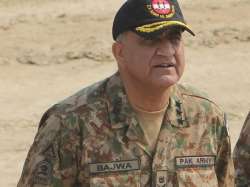Learn to differentiate between politics and military from India: Pak army chief
In a request to senior officers of army to read a book on how India has succeeded in keeping the military out of politics, Pakistan army chief General Qamar Javed Bajwa has told them that

In a request to senior officers of army to read a book on how India has succeeded in keeping the military out of politics, Pakistan army chief General Qamar Javed Bajwa has told them that the army had “no business” in operating the government.
“The army has no business trying to run the government. The army must remain within its constitutionally defined role,” The Nation newspaper quoted Bajwa as saying.
He also asked his officers to read a book titled 'Army and Nation' written by Steven I Wilkinson, a professor of Political Science and International Relations at Yale University, about Indian Army's relationship with the civilian government after independence.
Bajwa's comments during a gathering of senior army officers at Rawalpindi Garrison in the General Headquarters in December indicate a shift in Pakistan army's stance on its relationship with the civilian government and could be good news for Prime Minister Nawaz Sharif's government.
Bajwa, who took over from Raheel Sharif with whom the Prime Minister had a uneasy relationship, communicated to his officers in unequivocal terms that there should be cooperation and not competition between army and civilian leadership of the country.
The civil-military equation in Pakistan has always been a thorny issue.
From 1947 onward, Pakistan has been ruled by military dictatorships for half its history.
The last period of direct military government ended in 2008, but the military has retained considerable power and influence behind the scenes.
Bajwa also alluded that an impression of a competition between the civilians and the military is counter-productive for the country.
Wilkinson's book provides details of changes made in the structure and recruitment pattern of India army to suit the fledgling democracy in the new country.
The almost 300-page book makes for an interesting reading as it details why the democratic process in India has been a success.
Wilkinson argues that India took a number of steps after partition to correct the civil-military imbalance. Army or the civilian government have so far not commented about General Bajwa's remarks.
(With inputs from PTI)